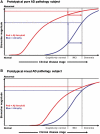Brain beta-amyloid measures and magnetic resonance imaging atrophy both predict time-to-progression from mild cognitive impairment to Alzheimer's disease
- PMID: 20935035
- PMCID: PMC2965425
- DOI: 10.1093/brain/awq277
Brain beta-amyloid measures and magnetic resonance imaging atrophy both predict time-to-progression from mild cognitive impairment to Alzheimer's disease
Abstract
Biomarkers of brain Aβ amyloid deposition can be measured either by cerebrospinal fluid Aβ42 or Pittsburgh compound B positron emission tomography imaging. Our objective was to evaluate the ability of Aβ load and neurodegenerative atrophy on magnetic resonance imaging to predict shorter time-to-progression from mild cognitive impairment to Alzheimer's dementia and to characterize the effect of these biomarkers on the risk of progression as they become increasingly abnormal. A total of 218 subjects with mild cognitive impairment were identified from the Alzheimer's Disease Neuroimaging Initiative. The primary outcome was time-to-progression to Alzheimer's dementia. Hippocampal volumes were measured and adjusted for intracranial volume. We used a new method of pooling cerebrospinal fluid Aβ42 and Pittsburgh compound B positron emission tomography measures to produce equivalent measures of brain Aβ load from either source and analysed the results using multiple imputation methods. We performed our analyses in two phases. First, we grouped our subjects into those who were 'amyloid positive' (n = 165, with the assumption that Alzheimer's pathology is dominant in this group) and those who were 'amyloid negative' (n = 53). In the second phase, we included all 218 subjects with mild cognitive impairment to evaluate the biomarkers in a sample that we assumed to contain a full spectrum of expected pathologies. In a Kaplan-Meier analysis, amyloid positive subjects with mild cognitive impairment were much more likely to progress to dementia within 2 years than amyloid negative subjects with mild cognitive impairment (50 versus 19%). Among amyloid positive subjects with mild cognitive impairment only, hippocampal atrophy predicted shorter time-to-progression (P < 0.001) while Aβ load did not (P = 0.44). In contrast, when all 218 subjects with mild cognitive impairment were combined (amyloid positive and negative), hippocampal atrophy and Aβ load predicted shorter time-to-progression with comparable power (hazard ratio for an inter-quartile difference of 2.6 for both); however, the risk profile was linear throughout the range of hippocampal atrophy values but reached a ceiling at higher values of brain Aβ load. Our results are consistent with a model of Alzheimer's disease in which Aβ deposition initiates the pathological cascade but is not the direct cause of cognitive impairment as evidenced by the fact that Aβ load severity is decoupled from risk of progression at high levels. In contrast, hippocampal atrophy indicates how far along the neurodegenerative path one is, and hence how close to progressing to dementia. Possible explanations for our finding that many subjects with mild cognitive impairment have intermediate levels of Aβ load include: (i) individual subjects may reach an Aβ load plateau at varying absolute levels; (ii) some subjects may be more biologically susceptible to Aβ than others; and (iii) subjects with mild cognitive impairment with intermediate levels of Aβ may represent individuals with Alzheimer's disease co-existent with other pathologies.
Figures



Comment in
-
Multiple imputation models should incorporate the outcome in the model of interest.Brain. 2011 Nov;134(Pt 11):e189; author reply e190. doi: 10.1093/brain/awr061. Epub 2011 Jun 6. Brain. 2011. PMID: 21646332 Free PMC article. No abstract available.
References
-
- American Psychiatric Association. Diagnostic and statistical manual of mental disorders, DSM-IV. Washington DC: American Psychiatric Association; 1994.
-
- Apostolova LG, Dutton RA, Dinov ID, Hayashi KM, Toga AW, Cummings JL, et al. Conversion of mild cognitive impairment to Alzheimer disease predicted by hippocampal atrophy maps. Arch Neurol. 2006;63:693–9. - PubMed
-
- Bennett DA, Schneider JA, Bienias JL, Evans DA, Wilson RS. Mild cognitive impairment is related to Alzheimer disease pathology and cerebral infarctions. Neurology. 2005a;64:834–41. - PubMed
Publication types
MeSH terms
Substances
Grants and funding
LinkOut - more resources
Full Text Sources
Other Literature Sources
Medical

